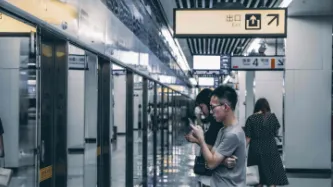Search
Content type: Examples
According to police plans to enhance “school safety”, security cameras and facial recognition will monitor children in Hong Kong in class and around educational facilities. The move is part of a trend also found in China, India, and the US toward mining children’s data, even though few benefits have been found.Article: Hong Kong schools adopt facial recognition and security camerasPublication: Biometric UpdateWriter: Christ Burt
Content type: Examples
The Focus1, or FuSi, from the US-based startup BrainCo, claims to measure how closely students are paying attention via electrodes that detect brain activity and send the data to teachers’ computers or a mobile app. Lights on the headband glow red, yellow, or blue to signify the level of engagement. A backlash against the headband has begun in China, where a local authorities ordered a school to suspend its use after it was profiled in the Wall Street Journal. Among other issues, it’s not clear…
Content type: Examples
The Nigerian startup uLesson, which began by offering pre-recorded lessons on dongles, now delivers livestreamed interactive video classes to learners in a number of African countries as well as the US and UK. One of uLesson's investors is Tencent, which also backed at least three Chinese EdTech companies between 2018 and 2021 before China began requiring companies teaching compulsory primary and middle school subjects in China to register as "nonprofit institutions".Article: Chinese-backed…
Content type: Examples
China is adding new features to its coronavirus surveillance app, which has helped many workers and employers return to their former lives, and looks likely to become a permanent fixture. Zhou Jiangyong, the Communist Party secretary of the eastern city of Hangzhou, has said the city's app, which it has begun linking to citizens' medical records, should become a beloved "intimate health guardian" for residents, who can use it to schedule hospital visits. The authorities are considering…
Content type: Examples
Amazon has spent $10 million to buy 1,500 cameras to take the temperature of workers from the Chinese firm Zhejiang Dahua Technology Company even though the US previously blacklisted Dahua because it was alleged to have helped China detain and monitor the Uighurs and other Muslim minorities.
The cameras work by comparing a person’s radiation with a separate infrared calibration device and uses face detection technology to make sure it is looking for heat in the right part of the subjects…
Content type: Examples
The Guangzhou Public Transportation Group has installed a biometric tablet next to bus drivers' seats so they can check the temperature and identity of every passenger who boards. The tablets will also photograph each passenger, allowing them to be identified by China's facial recognition network in the hope of helping control the spread of the novel coronavirus by enabling contact tracing for anyone displaying symptoms. The Group claims the data so gathered will only be used in the interests…
Content type: Examples
Among the Chinese companies making efforts to help the country respond to the coronavirus are the technology giants Alibaba, Baidu, ByteDance, Tencent, Xiaomi, and Foxconn. In order to fight misinformation, Baidu created a map layer on top of its standard Map App that shows real-time locations of confirmed and suspected cases of the virus so that people can avoid hot spots. Qihoo 360 has launched a platform travellers can use to check if anyone on their recent train or plane trips has since…
Content type: Examples
China: Manufacturer Telepower adds fever detection and facial recognition to point-of-sale terminals
According to a company announcement, Telepower Communication (Telpo), a leading Chinese manufacturer of smart point-of-sale systems and intelligent hardware, has integrated into its terminals new features to support a wide variety of contactless use cases. The company’s family of terminals for catering, retail, payment, security, and other applications, include biometric, fever-detecting facial recognition, and ticket validation technology. The technology supports accurate identification of up…
Content type: Examples
Software on smartphones dictates whether an individual should be quarantined. Chinese citizens in 200 cities, beginning with Hangzhou, are required to install the Alipay Health Code app, developed by Hangzhou's local government with the help of Alipay owner Ant Financial, on their smartphones. After users fill in a form with personal details, the software generates a QR code in one of three colors. Green enables its holder to move about unrestricted. Those with yellow codes may be asked to stay…
Content type: Case Study
In the Xingjiang region of Western China, surveillance is being used to facilitate the government’s persecution of 8.6million Uighur Muslims.
Nurjamal Atawula, a Uighur woman, described how, in early 2016, police began regularly searching her home and calling her husband into the police station, as a result of his WeChat activity.
WeChat is a Chinese multi-purpose messaging, social media and mobile payment app. As of 2013, it was being used by around 1million Uighurs, but in 2014 WeChat was…
Content type: News & Analysis
This creates a restraint on all people who merely seek to do as people everywhere do: to communicate freely.
This is a particularly worrying development as it builds an unreliable, pervasive, and unnecessary technology on top of an unnecessary and exclusionary SIM card registration policy. Forcing people to register to use communication technology eradicates the potential for anonymity of communications, enables pervasive tracking and communications surveillance.
Building facial recognition…
Content type: News & Analysis
This piece originally appeared here.
Creative Commons Photo Credit: Source
Tech competition is being used to push a dangerous corporate agenda.
High-tech industries have become the new battlefield as the United States and China clash over tariffs and trade deficits. It’s a new truism that the two countries are locked in a race for dominance in artificial intelligence and that data could drive the outcome.
In this purported race for technological high ground, the argument often goes, China…
Content type: Report
Countries with powerful security agencies are spending literally billions to equip, finance and train security and surveillance agencies around the world — including authoritarian regimes. This is resulting in entrenched authoritarianism, further facilitation of abuse against people, and diversion of resources from long-term development programmes.
Privacy International's report 'Teach 'em to Phish: State Sponsors of Surveillance' examines this problem closely, providng examples from US, China…
Content type: Long Read
Privacy International (PI) has today released a new report, 'Teach 'em to Phish: State Sponsors of Surveillance', showing how countries with powerful security agencies are training, equipping, and directly financing foreign surveillance agencies.
Spurred by advances in technology, increased surveillance is both powered by and empowering rising authoritarianism globally, as well as attacks on democracy, rights, and the rule of law.
As well as providing a background to the issue, the report…
Content type: Press release
Privacy International has today released a report that looks at how powerful governments are financing, training and equipping countries — including authoritarian regimes — with surveillance capabilities. The report warns that rather than increasing security, this is entrenching authoritarianism.Countries with powerful security agencies are spending literally billions to equip, finance, and train security and surveillance agencies around the world — including authoritarian regimes. This is…
Content type: Examples
In the remote western city Xinjiang, the Chinese government is using new technology and humans to monitor every aspect of citizens' lives. China, which has gradually increased restrictions in the region over the last ten years in response to unrest and violent attacks, blames the need for these measures on the region's 9 million Uighurs. This Muslim ethnic minority make up nearly half of the region's population, and the government accuses them of forming separatist groups and fuelling…
Content type: Examples
In a 2017 study of patterns of postings on Chinese social media, three Harvard researchers disagreed with the widespread claim that the government's strategy is to post "50c party" posts that argue for the government's side in policy and political debates. Instead, the researchers estimated that the Chinese government fabricates as many as 448 million social media comments a year but found that these avoid controversial issues and arguments with government skeptics. Instead, the researchers…
Content type: Examples
According to the US security firm Statfor the Chinese government has been builsing a system to analyse the massive amounts of data it has been collecting over the past years. The company claims: "The new grid management system aims to help the Chinese government act early to contain social unrest. Under the new program, grid administrators each monitor a number of households (sometimes as many as 200). They then aggregate their reports into one enormous surveillance database, where it is…
Content type: Press release
Below is a joint statement from Privacy International and Bytes for All.
This Friday, 27 September, marks the conclusion of the 24th session of the UN Human Rights Council, a session which has, for the first time, seen issues of internet surveillance in the spotlight. Privacy International and Bytes for All welcome the attention given at the Human Rights Council to this issue. However, we are concerned about developments which took place that threaten privacy rights and freedom of…
Content type: News & Analysis
This piece originally appeared in the Responsible Data Forum.
Would you mind if, every time you post a comment on Twitter, Facebook or another social media platform, the police logged it? I mean, it’s public — surely it’s fair game?
If you think that’s OK, then maybe it’s also OK for a police officer to follow you when you walk down a busy street. That’s also public, right?
Clearly, definitions of public and private become very problematic when you are communicating with potentially…
Content type: Advocacy
Privacy International has today written to Danish ministers and authorities seeking urgent assurances following a report published two days ago in Information showing that the government has approved the export of an internet surveillance system to China.
The report, which relies in part on documents obtained from the Danish Business Authority – the department which oversees exports of surveillance technology – shows that the government has authorised a company based in…
Content type: News & Analysis
Privacy International has today written to Danish ministers and authorities seeking urgent assurances following a report published two days ago in Information showing that the government has approved the export of an internet surveillance system to China.
The report, which relies in part on documents obtained from the Danish Business Authority – the department which oversees exports of surveillance technology – shows that the government has authorised a…
Content type: News & Analysis
Privacy International this week submitted stakeholder reports to the United Nations Human Rights Council1 about the human rights records of China, Senegal and Mexico. The reports, prepared in preparation with our partners in the respective countries, analyse the extent to which the right to privacy is respected and protected, and detail instances of privacy violations.
The stakeholder reports will inform the questions asked by members of the Human Rights Council when China, Senegal and…
Content type: Advocacy
This stakeholder report is a joint submission by Privacy International (PI) and the Law and Technology Centre of the University of Hong Kong (HKU). PI is a human rights organisation that works to advance the right to privacy and fight surveillance around the world. PI has been working with HKU to conduct research and policy engagement on privacy and data protection issues in China and Hong Kong since 2009. Together, PI and HKU wish to bring concerns about the protection and promotion of the…
Content type: News & Analysis
Skype has consistently assured that it protects its users and their communications. Having reviewed the company's technology and policies we have grounds for concern about Skype's overall level of security, and we believe there are a number of questions to which the company must respond. Skype's misleading security assurances continue to expose users around the world to unnecessary and dangerous risk. It's time for Skype to own up to the reality of its security and to take a leadership…












